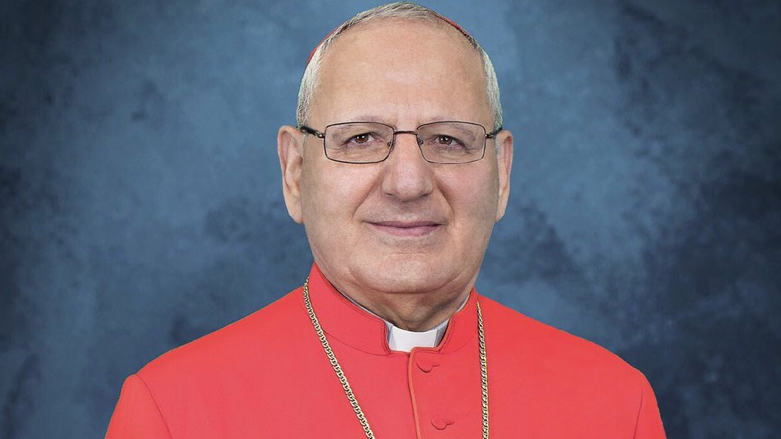U.S. Slams Baghdad for Mistreatment of Catholic Leader; Welcomed in the Kurdistan Region
Miller expressed Washington's concern that Cardinal Sako’s position was “under attack from a number of quarters, in particular a militia leader” whom the U.S. has sanctioned for gross human rights abuses.

WASHINGTON DC, United States (Kurdistan 24) –Speaking to reporters on Tuesday, State Department Spokesperson Matthew Miller strongly criticized the Iraqi government for its mistreatment of an important Christian leader in Baghdad.
“We are disturbed by the harassment of Cardinal Sako, the patriarch of the Chaldean Church, and troubled by the news that he has left Baghdad,” Miller said.
Early this month, the President of Iraq, Abdul Latif Rashid, issued a decree, replacing one from 2013, that had been issued by the long-time Kurdish leader, the late Jalal Talabani. It had designated Cardinal Louis Raphael Sako as head of the Chaldean Catholic Church in Iraq.
Baghdad’s revocation of his status put Sako in a vulnerable position. He is subject to a court summons. Thus, for his personal safety, he has relocated to a monastery in the Kurdistan Region, as he announced in a letter released on Saturday.
Read More: Patriarch of Iraqi Chaldean Church transfers from Baghdad to Erbil
“The Iraqi Christian community is a vital part of Iraq’s identity and a central part of Iraq’s history of diversity and tolerance,” Miller continued, as he addressed reporters at Tuesday’s press briefing.
“We are in continuous contact with Iraqi leaders on this matter,” he added.
Yet Miller was being generous toward Baghdad. Outside of the Kurdistan Region, Iraq is not known for religious tolerance. Rather, it has been a persistent problem, as detailed regularly in the State Department’s annual reports on religious freedom.
Read More: US report highlights religious tolerance of Kurdistan Region
Miller expressed the State Department’s concern that Cardinal Sako’s position was “under attack from a number of quarters, in particular a militia leader” whom the U.S. has sanctioned for gross human rights abuses.
Does a Good Christian Cut Off People’s Ears?
Miller was referring to Rayan al-Kildani, head of a Christian militia associated with the Iranian-backed Hashd al-Shaabi, or Popular Mobilization Forces (PMF), which were created after 2014 to repel ISIS’s assault on Iraq.
Kildani heads the 50th Brigade militia. He was sanctioned by the U.S. in 2019.
In 2018, “a video circulated among Iraqi human rights civil society organizations in which Kildani cut off the ear of a handcuffed detainee,” the statement from the U.S. Treasury Department announcing the sanction on Kildani explained.
The statement also described the 50th Brigade as “the primary impediment to the return of internally displaced persons to the Ninewa Plain,” while it “has systematically looted homes in Batnaya,” a Christian village occupied by ISIS.
Moreover, Kildani’s brigade has “illegally seized and sold agricultural land, and the local population has accused the group of intimidation, extortion, and harassment of women,” the Treasury Department said.
It’s about Money and Power
The statement which Sakho issued on Saturday echoed aspects of the Treasury Department’s much earlier statement. At the heart of this dispute is a grab for money and power, it appears.
Sakho suggested that Kildani’s militia, or, rather, its political wing, the Babylon Movement, was pushing Baghdad to appoint Kildani as head of the Church, including its endowment, with one of his brothers, Aswan, as his deputy, and several other relatives in senior positions.
The Christian news agency, OSV News, reporting from Amman, Jordan, explained that while the Babylon Movement “claims to represent Iraq’s Christian community,” it “has little or no Christian support and primarily represents Kildani’s personal interests.”
“Analysts also see Iran further tightening its influence over Iraqi politics,” the news agency added.
Religious Tolerance of Kurdistan Region
In contrast to the Arab areas of Iraq, the Kurdistan Region is known for its religious tolerance. That tolerance goes back to the days of Mullah Mustafa Barzani, for whom unity was a key value.
Two months ago, a memorial to the legendary Kurdish leader, the Barzani National Memorial, was inaugurated. It includes three domes, which, as a plaque at the memorial explains, “symbolize the brotherly coexistence of the three religions of Islam, Christianity, and Judaism in the Barzan area.”
Read More: President Masoud Barzani attends the second day of the Barzani National Memorial ceremony
That tolerance is also reflected in the large number of Christians who have found refuge in the Kurdistan Region.
As the Director of Christian Affairs at the Ministry of Endowments and Religious Affairs of the Kurdistan Regional Government recently explained, half a million Christians have migrated to the Kurdistan Region, after the toppling of Saddam Hussein’s regime.
The latest Christian to find refuge in the Kurdistan Region is no less than Cardinal Sako himself.
Sako was actually born there, in the town of Zakho in 1948. So, in at least one key respect, Sako has now returned home.
